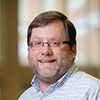This article is more than 5 years old.
Okay, so by now you know what’s coming: I apologize for being so darn late in writing this blog post. I lost my notebook! The dog ate my homework! I had to see a guy about a thing! I know there’s no good excuse for writing about a conference almost two months after it happened, but I promise I’ll not get that far behind again.
Anyway, the 2015 NASIG Conference in Washington, DC (well, technically Crystal City, Virginia, but close enough) was a very special one for me, because I served as president at this conference. Also, it was our 30th anniversary (there was a nice party to celebrate) and NASIG did its first joint program with another organization (the Society for Scholarly Publishing, or SSP) since 1992. Presiding over the conference was a fun if slightly nerve-wracking experience, as it entailed far more public speaking than I am comfortable with (for the record, I am comfortable with approximately zero public speaking, so, more than that).
Chris and Derrik have both written about the conference proper, so I think I’ll delve into the joint program with SSP a bit. Now, full disclosure, I was on the planning group that organized this event, so I might be a little biased in my reporting. The joint program was called “Evolving Information Policies and Their Implications: A Conversation for Librarians and Publishers,” and it consisted of three keynote addresses, one each by a publisher (Jayne Marks of Wolters Kluwer), a librarian (T. Scott Plutchak of the University of Alabama, Birmingham), and a vendor (Caitlin Trasande, formerly of Digital Science), a panel of two intellectual property lawyers (Peter Jaszi, Professor of Law at American University, and Michael Remington of the firm Drinker Biddle & Reath), and a closing panel with all five previous speakers.
Although each of them brought up interesting points, (especially Jayne Marks conversation about how publishers are experimenting with new models and tools for their customers, but it is difficult to fully develop them because every customer wants their products customized and personalized to such an extent that the publishers are constantly stuck in development), I will focus on Scott Plutchak’s keynote, which addressed the problems related to preserving and providing access to research data sets. Plutchak emphasized how current and trendy this issue is with the memorable phrase, “Data is the new bacon.” However, research data sets are also enormously difficult to manage. Plutchak said that managing research data sets is a “wicked problem.” This is not just a snappy way to refer to the problem, but an actual term from social planning. Wicked problems are problems that have edges that are hard to define, that require a multi-disciplinary approach, and that is probably not solvable in one permanent way, but that can be mitigated and managed (an example might be urban planning). According to Plutchak, when it comes to preserving and providing access to material, “Publications are easy, data is a beast.” One of the complicating factors is that now, not only are funding agencies often demanding data set deposits, so too are publishers, which means researchers are getting hit from both sides. Plutchak argues that managing data sets is an institutional issue, not just a library issue, and the problem can’t be handled like we do with institutional repositories for publications (which are easy, but data is a beast). To manage data sets, not only will libraries need to be involved, but also academic research offices, information technology departments, faculty, etc. If researchers are going to be successful with grants, we will need to have infrastructure, policies, and resources in place to manage their data sets.
Plutchak’s keynote address was probably the most interesting and share-worthy of the conference content I was able to attend and focus on without having to do presidenting. Between welcoming folks to the joint program, opening and closing the conference, doing a drawing at the first-timer’s reception, introducing a keynote speaker, conducting the all-conference business meeting, installing my successor as NASIG President (the intrepid Carol Ann Borchert of the University of South Florida), speaking at the 30th anniversary celebration, and conducting the NASIG Executive Board meeting (which I actually enjoyed), I was kept quite busy. But I have to say, it was very cool to be comped the hotel’s presidential suite. All in all, it was an exhausting, but extremely satisfying experierience.

1 Comment on ‘Steve at NASIG 2015’
Thanks for sharing a summary of Scott Plutchak’s keynote. I know the whole question of data is a big issue that we will have to address more and more in the future. Congratulations on presiding over a successful conference!